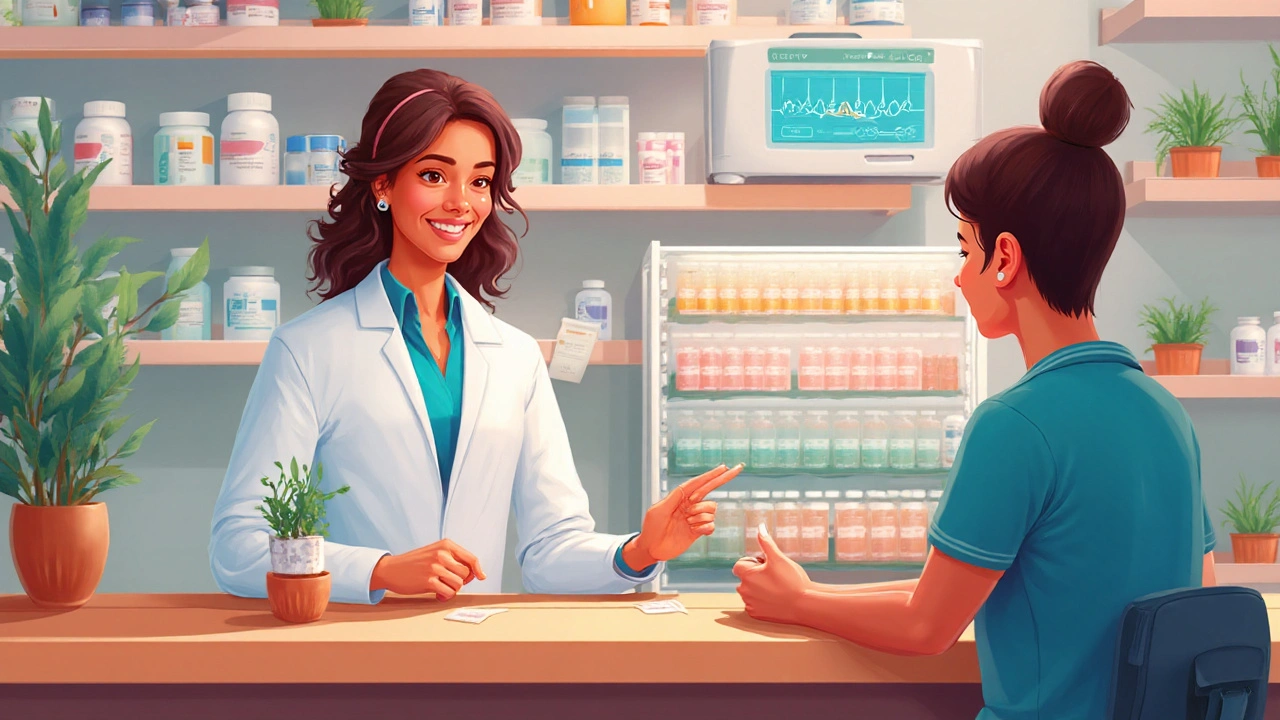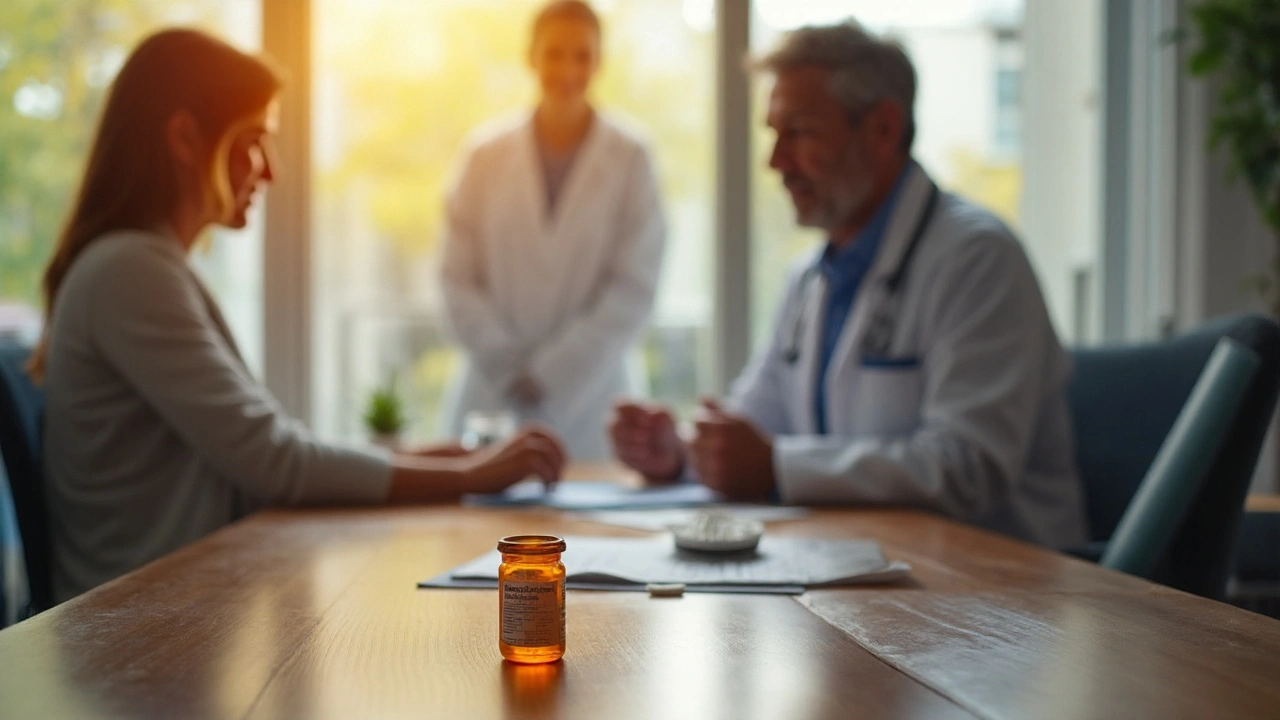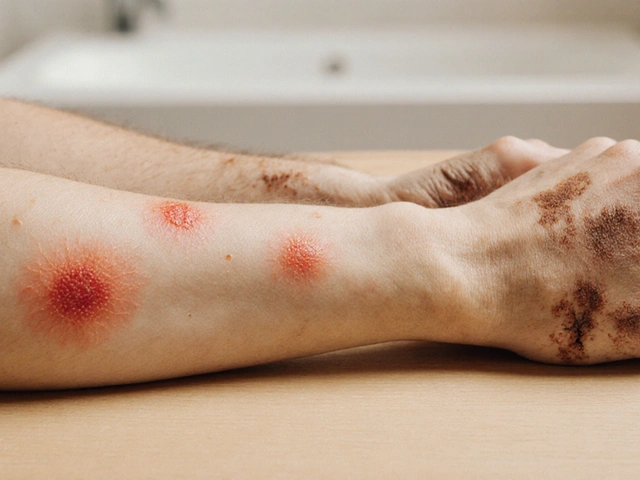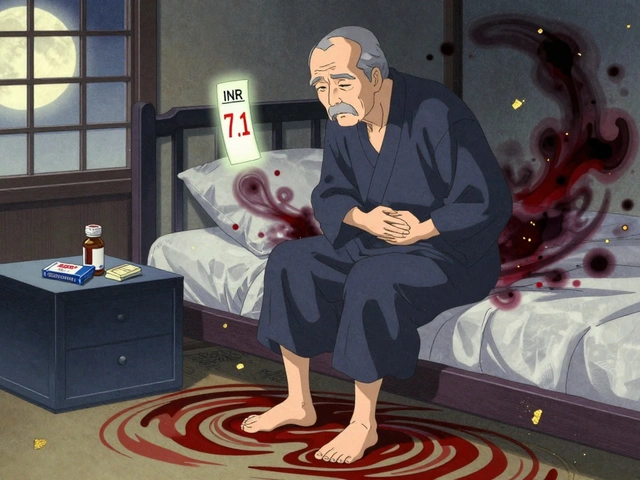Nitroglycerin Safety Checker
Nitroglycerin is a fast‑acting nitrate medication that relaxes blood vessels and eases chest pain caused by reduced heart blood flow. While doctors prescribe it for angina, a growing number of patients wonder whether nitroglycerin alternative medicine combos can boost results or cut side‑effects.
How Nitroglycerin Works
When nitroglycerin enters the bloodstream it releases nitric oxide, a molecule that triggers vasodilation - the widening of blood vessels. This drop in vascular resistance lowers the heart’s workload and improves oxygen delivery to heart muscle. The effect starts within minutes for sublingual tablets and lasts a few hours for patches.
Conventional Uses and the Role of Angina
Angina pectoris is a symptom of coronary artery disease characterized by chest discomfort triggered by exertion or stress. Nitroglycerin is the go‑to rescue drug for acute attacks and a preventive option when taken before known triggers. Guidelines from the American College of Cardiology and the European Society of Cardiology still rank it as a classI recommendation for symptomatic relief.
Why Patients Turn to Alternative Medicine
Many people seek natural or complementary approaches because they fear chronic headaches, sudden drops in blood pressure, or drug interactions. Herbs, acupuncture, and mineral supplements claim to support circulation, reduce oxidative stress, or improve endothelial function - all of which sound like they could work hand‑in‑hand with nitroglycerin.
Potential Benefits of Combining Nitroglycerin with Alternative Therapies
Evidence is mixed, but a few patterns emerge:
- Herbal vasodilators such as Ginkgo biloba may augment nitric‑oxide pathways, potentially allowing lower nitroglycerin doses.
- Traditional Chinese medicine Dan Shen (Salvia miltiorrhiza) has documented anti‑platelet and vasodilatory actions, which could improve overall coronary flow.
- Magnesium supplementation helps maintain vascular smooth‑muscle relaxation and may blunt the intensity of nitroglycerin‑induced headaches.
When these adjuncts are used under physician supervision, some patients report fewer rescue doses and smoother symptom control.

Risks, Side‑Effects, and Drug Interactions
Combining nitroglycerin with other vasodilators isn’t without hazards. Common side‑effects of nitroglycerin include throbbing headaches, dizziness, and hypotension. Adding another blood‑pressure‑lowering agent can push numbers too low, leading to fainting or syncope.
Drug interactions occur when two substances affect each other's absorption, metabolism, or physiological action. Notable culprits are:
- PDE5 inhibitors (Viagra, Cialis) - combined use can cause severe hypotension.
- High‑dose ginseng - may enhance nitric‑oxide release, amplifying nitroglycerin’s effect.
- Alcohol - additive vasodilatory effect, raising the risk of dizziness.
Patients with severe liver disease or on certain antihypertensives should avoid self‑medicating with herbal agents without medical advice.
Evidence Summary: Clinical Trials and Guidelines
Randomized controlled trials (RCTs) on nitroglycerin plus herbs are scarce. A 2022 Chinese study involving 120 angina patients compared standard nitroglycerin therapy versus nitroglycerin plus DanShen extract. The combination group showed a 15% reduction in weekly nitroglycerin use and modest improvement in exercise tolerance, but the trial lasted only 8weeks and lacked a double‑blind design.
Systematic reviews from the Cochrane Library note that while some herbal extracts have vasodilatory properties, the quality of evidence is low and safety data are limited.
Professional societies still advise that any adjunct therapy be disclosed to the prescribing cardiologist and monitored with blood‑pressure checks.
Comparison of Nitroglycerin with Common Herbal Vasodilators
| Attribute | Nitroglycerin (pharma) | Ginkgo biloba (herb) | Dan Shen (herb) |
|---|---|---|---|
| Primary mechanism | NO‑mediated vasodilation | Flavonoid‑induced endothelial relaxation | Salvianolic acids - anti‑platelet & vasodilatory |
| Evidence level | LevelI (RCT, guideline‑backed) | LevelIII (small trials) | LevelIII (regional studies) |
| Typical dose | 0.3‑0.6mg sublingual PRN | 120‑240mg standardized extract daily | 1‑2g dried root decoction daily |
| Common side‑effects | Headache, hypotension, flushing | Gastro‑intestinal upset, mild dizziness | Bleeding risk, mild nausea |
Notice that herbal options lack the rapid onset of sublingual nitroglycerin, making them unsuitable for emergency relief but potentially useful as chronic adjuncts.
Practical Guidance: Decision Checklist
- Confirm your diagnosis - nitroglycerin is indicated for angina, not general chest discomfort.
- List every supplement, herb, or over‑the‑counter product you take.
- Check for known interactions (e.g., PDE5 inhibitors, high‑dose ginseng).
- Discuss with your cardiologist: ask whether a low‑dose herbal vasodilator could be added safely.
- Monitor blood pressure and symptom frequency for at least two weeks after any change.
- If headaches become unbearable, consider reducing nitroglycerin dose or adding magnesium (400‑500mg daily) under guidance.
Following this checklist helps you stay in control and avoid unexpected drops in blood pressure.
Related Concepts and Next Steps
Beyond herbs, other delivery forms of nitroglycerin influence risk‑benefit balance:
- Transdermal patch provides steady plasma levels over 24hours, reducing headache spikes but increasing skin irritation risk.
- Sublingual tablet remains the fastest rescue option for sudden chest pain.
- Emerging nitroglycerin ointment allows titration by skin surface area.
Future reading could explore “Nitroglycerin Pharmacokinetics”, “Herbal Cardiovascular Support”, or “Integrative Cardiology Guidelines”. Each topic digs deeper into how conventional and alternative methods can coexist safely.

Frequently Asked Questions
Can I take Ginkgo biloba with my nitroglycerin prescription?
Ginkgo may enhance vasodilation, so a low dose can be safe for many patients, but it also raises bleeding risk. Always ask your cardiologist before combining them.
What is the biggest side‑effect I should watch for?
A sudden drop in blood pressure leading to dizziness or fainting is the most concerning. If you feel light‑headed after a dose, sit down and check your pulse.
Are there any natural alternatives that work as fast as nitroglycerin?
No herbal or supplement has the rapid onset of sublingual nitroglycerin. Natural agents are better suited for long‑term support, not emergency relief.
Should I stop nitroglycerin if I start a supplement regimen?
Never stop a prescribed medication without consulting your doctor. A clinician can adjust the dose or timing to accommodate new supplements safely.
Is magnesium effective for reducing nitroglycerin headaches?
Some small studies suggest magnesium helps relax vascular smooth muscle, which can blunt the headache response. A typical supplement dose is 400mg elemental magnesium per day, taken with food.
What monitoring should I do when adding an herbal vasodilator?
Check your blood pressure twice daily for the first week, note any new headaches, and keep a log of nitroglycerin usage. Report any significant changes to your healthcare provider.





Been using Dan Shen for 6 months now with my nitro patches-headaches are way less intense. Not saying it’s magic, but my cardiologist didn’t flip out when I told him. Just keep an eye on the BP, man. I check it every morning now. No more dizzy spells walking to the fridge.
It’s fascinating how we’ve outsourced our body’s innate wisdom to pharmaceutical corporations who profit from our fear of discomfort. Nitroglycerin, a molecule derived from dynamite, is prescribed to treat the symptom of a disease caused by our collective abandonment of ancestral diets, movement, and breath. We don’t ask why our arteries calcify-we just shove a nitrate under our tongue and call it a day. The real alternative medicine? Living like a human being, not a data point in a clinical trial.
Oh wow, so now we’re giving people ginkgo and magnesium because nitroglycerin’s side effects are too ‘uncomfortable’? Next thing you know, someone’s rubbing lavender oil on their chest and calling it ‘cardiovascular support.’ I’m not saying it’s not nice to be holistic, but if your heart’s failing, don’t pray to the herbs-call 911.
Man in Delhi, I take garlic every day, not because I read a study, but because my dad did it for 40 years and he’s still walking to the temple at 82. Nitro? Yeah, I use it when the pressure hits. But I also drink hibiscus tea, walk barefoot in the garden, and sleep like a log. No magic, just rhythm. You think your heart doesn’t know the difference between a pill and a life lived right?
I tried magnesium for the headaches and it actually worked. 400mg before bed. No more waking up with my skull about to explode. Just saying.
So you’re telling me that instead of just taking the damn pill like a normal person, now we gotta Google ‘herbal vasodilators’ and play Russian roulette with our blood pressure? I’m not against herbs, but if your heart’s screaming for help, don’t make it a yoga class. Just take the nitro. Save the experiments for when you’re not one sneeze away from a heart attack.
Wendy’s right-this whole ‘alternative medicine’ trend is just capitalism repackaging placebo as empowerment. You think ginkgo biloba is ‘natural’? It’s a concentrated extract from trees grown in monocultures with pesticides, shipped across oceans, and sold in capsules labeled ‘standardized.’ Meanwhile, nitroglycerin? It’s been tested in over 80,000 patients. One’s a billion-dollar industry. The other’s a molecule with a 150-year track record. Don’t confuse tradition with truth.
Wait, so now we’re encouraging people to mix nitro with ginseng? Bro, that’s like putting diesel in a Tesla. You think the body’s some zen garden where all the vibes harmonize? Nah. It’s a chemical factory with zero chill. One wrong combo and you’re flat on the floor. I’ve seen it. People think ‘natural’ means ‘safe.’ It doesn’t. It means ‘unregulated.’
My mom takes nitro and turmeric. She checks in with her doctor every month. No drama. Just care. Maybe that’s the real answer-communication, not competition.
Ohhh so now we’re all herbalists? I’ve got my 7-day detox tea, my CBD oil, my Himalayan salt inhaler, and my nitro patch. And guess what? I’m still alive. But if you’re gonna do this, DO IT RIGHT. Don’t just throw ginkgo in because you saw it on Instagram. Talk to your doctor. Actually listen. And if your doctor says no? Then maybe… just maybe… you should listen. Not because they’re the boss, but because your life isn’t a TikTok trend.